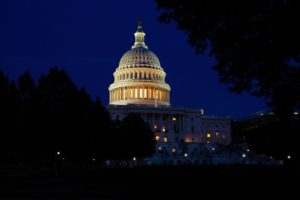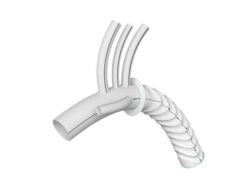 In the U.S., the legislative process is complex. Among the most important in this process are congressional committees, which play a pivotal role in shaping policy concepts, drafting legislative proposals and shepherding them through the path to becoming law. These committees are specialized groups of members with expertise in relevant policy areas. There are key committees known as our “Committees of Jurisdiction,” where legislation relevant to vascular surgery is channeled.
In the U.S., the legislative process is complex. Among the most important in this process are congressional committees, which play a pivotal role in shaping policy concepts, drafting legislative proposals and shepherding them through the path to becoming law. These committees are specialized groups of members with expertise in relevant policy areas. There are key committees known as our “Committees of Jurisdiction,” where legislation relevant to vascular surgery is channeled.
When a bill is introduced in the House of Representatives or the Senate, it typically undergoes a series of committee hearings and markups. Committee members gather valuable information through hearings. During “markups,” committee members critically review and refine the proposed legislation, incorporate amendments and deliberate the proposed legislation. Following these deliberations, the committee votes on whether to advance the bill to the full chamber for consideration. This process allows for thorough examination and refinement of legislation before reaching the broader legislative body.
The Senate Finance Committee, responsible for matters pertaining to taxation and revenue measures, wields extensive jurisdiction within the Senate. These large and powerful committees are broken down into subcommittees, where legislation is analyzed by subject matter. The Subcommittee on Healthcare has jurisdiction over anything related to healthcare finances, meaning it can have joint or sole jurisdiction over the activities of various agencies and offices. This includes the Department of Health and Human Services (HHS), which oversees the Centers for Medicare & Medicaid Services (CMS). This overarching influence makes this committee powerful regarding any legislation that touches federal revenue streams. Another example is the Senate Appropriations Committee, where subcommittees are tasked with drafting legislation to allocate funds.
Outside of the budgeting process, there are subject matter committees, such as the Committee on Health, Education, Labor, and Pensions, simply known as HELP. The HELP Committee’s jurisdiction includes most federal labor and employment laws, including those that regulate wages and hours of employment. For vascular surgeons, the HELP Committee holds significant importance due to its jurisdiction over legislation related to healthcare policies and regulations. The committee’s decisions on healthcare reform, medical device regulations, workforce training, and research funding profoundly influence the practice environment, reimbursement structures, and access to innovative treatments. The actions and policies shaped by the Senate HELP Committee have a direct bearing on advancing vascular surgery services and patient care outcomes.
The House of Representatives has a complementary structure, with its own Committee on Appropriations with a Subcommittee on Labor, Health and Human Services, Education and Related Agencies. The House of Representatives and Senate committees individually create budgets and then come to an agreement by the end of each fiscal year to prevent a government shutdown.
In terms of subject matter, two of the most influential committees on health policy in the House are the Committee on Ways and Means and the Committee on Energy and Commerce, both of which have health subcommittees. The Ways and Means Committee primarily deals with taxation, social welfare programs and trade, whereas the Energy and Commerce Committee addresses energy, healthcare, telecommunications and consumer protection issues. These committees differ from appropriations as they work with the content of the proposed legislation, compared to the Appropriations Committee, which focuses on simply allocating federal funds.
The committees of jurisdiction in both chambers of Congress serve as crucial gatekeepers in the legislative process, overseeing specific policy areas and shaping the trajectory of proposed bills. Their role is pivotal in ensuring that proposed laws undergo rigorous scrutiny and reflect a comprehensive understanding of the issues. By serving as conduits for legislative action, these committees contribute to the effectiveness and integrity of the legislative process, fostering informed decision-making and accountability within Congress.
Kelli L. Summers, MD, is a graduate of the SVS’ Advocacy Leadership Program.












